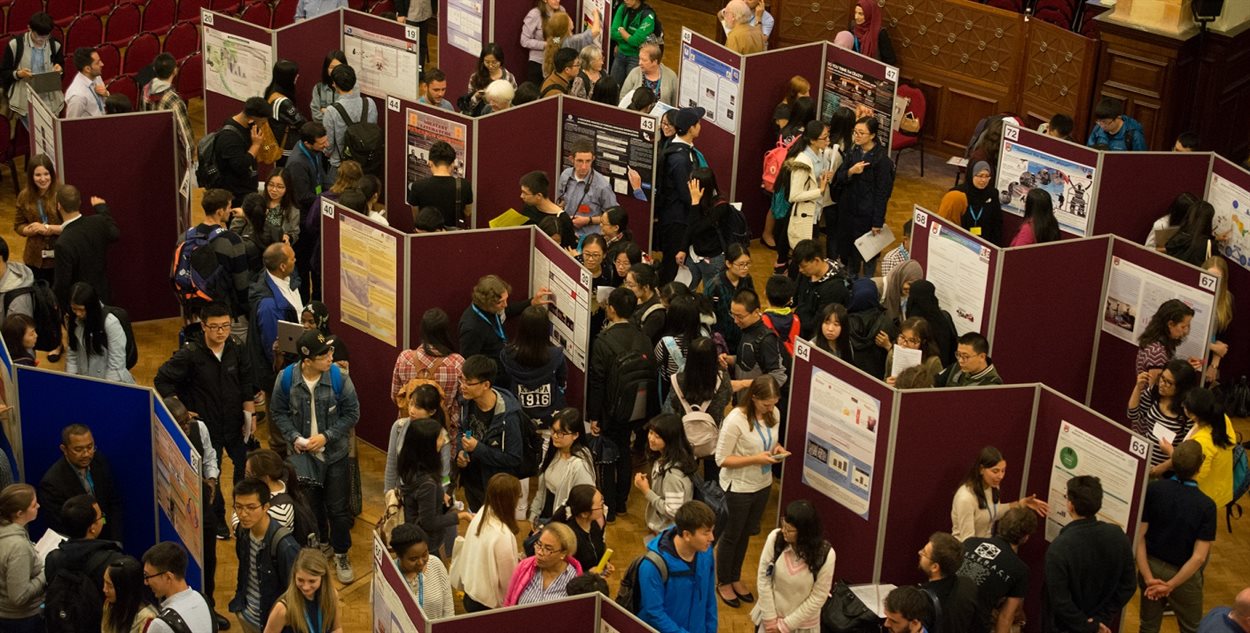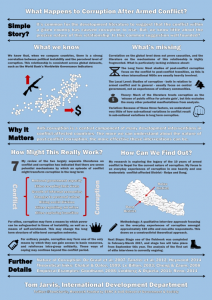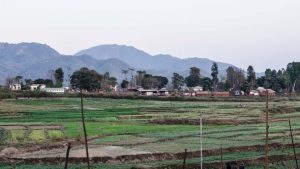Tom Jarvis is a second-year PhD student in the International Development Department at the University of Birmingham, where he also completed an MA in Social Research. He also holds an MA in Post-Conflict Recovery Studies from the University of York, and has previously worked as a researcher in the UK criminal justice sector. His research focuses on the effects of armed conflict on corruption at the local level, and in particular on the relationship between these phenomena in the wake of the 1996-2006 armed conflict in Nepal.
IDD’s Tom Jarvis has won the award for the best research poster in the College of Social Sciences in the 2017 Graduate School Poster Conference held at the Aston Webb Building in the University of Birmingham. We interviewed Jarvis to learn more about his research on the effects of armed conflict on corruption, and to get an understanding of what the poster conference was all about.

Tell us more about the 2017 Graduate School poster conference and what your presentation at this conference was about
The conference was a showcase of research from all across the University, which offered researchers a chance to engage with the public on the issues they are dealing with, and respond to questions. A great part of the day was the opportunity to network with others from a huge range of disciplines, and to see the diversity of work ongoing at the University. I spoke with researchers working on everything from biblical translation to cleft palate repair.
For my own poster and presentation, I’m fortunate in that the topics I deal with are often of interest to a wider audience, as well as being amongst the most prominent in international development. But this also means that those I was discussing my work with often had strong ideas about the rights and wrongs of the subject, particularly on the (un)acceptability of corruption. Because of this, one of the things I sought to do when speaking with the judges and the public was to challenge preconceptions about corruption. Influenced by recent developments in the field, I did so by asking if those I was speaking with considered it ‘right’ to pay a bribe in some challenging scenarios, such as if it was necessary to access basic necessities in time of crisis. These scenarios were designed to introduce the idea that the value judgements we have around corruption are deeply rooted in the circumstances we face.
As well as trying to challenge the preconceptions we might all have about corruption, I also sought in my poster to explain why understanding the relationship between the impacts of armed conflict and corruption is significant in the first place. Beyond the academic interest in connecting these two much-studied phenomena, I discussed how the overlap between conflict-affectedness and high levels of corruption has led to a concentration of international anti-corruption work in conflict-affected contexts. Given the importance of context to effectively assessing and minimising the harm corruption may cause, I see my research as expanding on a potentially significant contextual factor, which has largely been neglected by much the literature on the determinants of corruption.
As a researcher, the experience of sharing your work with others must really be exciting
I very much recommend the experience of the poster conference, both as a way of getting research out there to a wider audience, and as a way of clarifying and refining thoughts around complex problems. As an added bonus, the judges awarded College and University level prizes based on the poster and presentation, and it was very nice to be award the College of Social Science prize for my work.
What is the focus of your PhD research?
For my PhD research, I’m examining the relationship between armed conflict and corruption. Within this broad topic, I’m focusing on how attitudes and value judgements towards corruption amongst ordinary people are transformed by their experiences of armed conflict. These experiences range from their changing interactions with the police and security forces over time, to having to adjust to resource scarcity through informal networks during the conflict. I’m particularly interested in if these attitudinal changes persist in the long term, and if there is a link between variations in specific aspects of the experience of conflict, and variations in attitudes and understandings of corruption.
The empirical element of my research involves assessing experiences of corruption amongst conflict-affected populations in Nepal. Nepal was the site of conflict between 1996 and 2006, and subsequently has seen a protracted political transition towards peace and greater stability. In addition to this legacy of conflict, the links between corruption and conflict is particularly significant in the case of Nepal, as it is often judged in measures such as the Corruption Perceptions Index to be amongst the most affected by corruption in Asia. The issues of post-conflict transition and recovery, and of the impacts of corruption, are also very much at the forefront of political discourse amongst Nepalis.

An image of the Nepal Army base in Ghorahi, Dang District, which was the site of the first major confrontation between the military and the Maoists
One of your papers has just been published in the International Peacekeeping journal. Tell us a bit about this project and what were some of your arguments?
I’ve been fortunate enough to work with Claire Smith from the University of York on the How Mass Atrocities End Project, funded by the World Peace Foundation. Drawing on work from this, we’ve recently published an article in International Peacekeeping. This article provides a challenge and a reinterpretation of the dominant view of the ending to the mass violence seen in East Timor in September 1999. This is a highly significant case, as it was widely presented both at the time and in the subsequent literature on intervention to be a model example of military intervention to end mass atrocity violence.
In the article, we first challenge the view that the arrival of international troops brought about an end to the violence. We do so through a new analysis of existing data around the level and distribution of killings in September 1999, and through analysing the range of eyewitness accounts available. Through this, we show that the level of killings had dramatically reduced prior to the arrival of international troops in East Timor. The article then considers what, if not the international military intervention, resulted in the ending to mass violence in this case. Here, we focus on the internal political dynamics of the Indonesian political and military establishment, and demonstrate how the violence came to an end through the brief alignment of moderate elements with the Indonesian regime.
Fresh from winning the Poster Conference, what is next in your academic journey?
I’m returning to Nepal for the final stage of my fieldwork in September, and so most of my effort is geared towards preparing my research methods for this. My last period of fieldwork examined how local elites (political leaders, social activists, journalists, and others) experience corruption and the legacy of the 1996-2006 conflict, and I’m returning to expand this to include the wider population. Alongside this, I’m working on an article which looks at the boundary between liberal and illiberal actors in peacebuilding. This draws together my PhD research with my work around ending mass violence – and considers how attitudes to corruption blur the distinction between these sets of actors.
